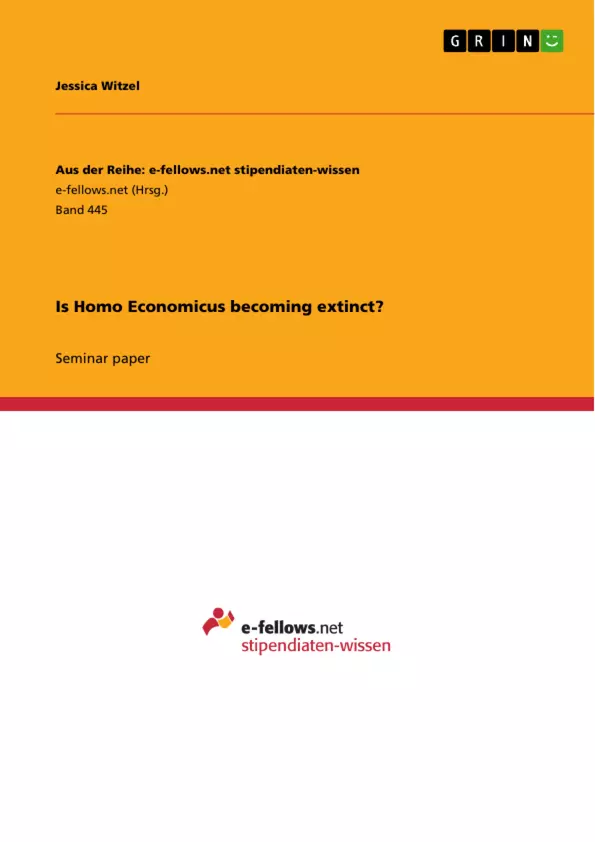1. Introduction
In his famous article “A Behavioral Model of Rational Choice” from 1955, Herbert Simon already called the concept of the Homo Economicus into question and explained:
“The concept of “economic man” is in need of fairly drastic revision. […] The task is to replace the global rationality of economic man with a kind of rational behavior that is compatible with the access to information and the computational capacities that are actually possessed by organisms exist. One is tempted to turn to the literature of psychology for the answer.”
Inhaltsverzeichnis (Table of Contents)
- Introduction
- Behavioral Economics
- History
- Definition
- Experimental Economics and Neuroeconomics
- Neoclassical Economics
- Advantages of the Standard Economic Model
- Criticism
- Behavioral Economic Model
- Principle 1: People are influenced by Other's Behavior
- Herding
- Social Proof
- Principle 2: Habits are important
- Status Quo Bias
- Principle 3: People can act altruistically
- The Ultimatum Game
- Principle 4: People's Self-Expectations influence Behavior
- Cognitive Dissonance
- Principle 5: People are loss-averse
- Endowment-Effect
- Sunk-Cost Effect
- Principle 6: People are bad at Computation when making Decisions
- Salience
- Hyperbolic Discounting
- Framing
- Intuition
- Principle 7: People need to feel involved and effective to make a Change
- Illusion of Control
- Hindsight Bias
- Résumé
- Principle 1: People are influenced by Other's Behavior
Zielsetzung und Themenschwerpunkte (Objectives and Key Themes)
This paper examines the evolving field of behavioral economics, comparing it with the traditional neoclassical model of economics. The objective is to analyze the validity of the concept of "Homo Economicus" in light of insights from behavioral economics. The work explores key themes such as:- The historical development of behavioral economics and its roots in neoclassical economics.
- The limitations of the standard economic model and the criticisms it has faced.
- The influence of psychological factors on economic decision-making, including social influences, habits, and self-perception.
- The impact of cognitive biases and computational limitations on individual behavior in economic contexts.
- The implications of behavioral economics for understanding and shaping economic outcomes.
Zusammenfassung der Kapitel (Chapter Summaries)
Introduction
The introduction sets the stage for the paper by examining the historical context of behavioral economics. It discusses Herbert Simon's challenge to the concept of "Homo Economicus" and the growing acceptance of psychological perspectives in economics. It highlights the contributions of Daniel Kahneman, Vernon Smith, and other pioneers in the field.Behavioral Economics
This chapter delves into the history and definition of behavioral economics. It explores the contributions of early economists like Adam Smith and Jeremy Bentham who considered psychological factors in their work. It then traces the development of the field, emphasizing the influence of seminal papers by Kahneman, Tversky, and Thaler. The chapter concludes with a definition of behavioral economics, emphasizing its focus on human limitations and complexities in economic decision-making.Neoclassical Economics
This chapter examines the advantages and criticisms of the standard economic model. It discusses the assumptions of rationality and self-interest underlying this model and explores the strengths of its mathematical rigor. The chapter also highlights the criticisms of this model, arguing that it often fails to account for real-world behavior and decision-making processes.Behavioral Economic Model
This chapter presents a detailed overview of the key principles of behavioral economics. It explores how social influences, habits, self-expectations, and cognitive biases impact economic choices. The chapter examines specific concepts such as herding, social proof, status quo bias, cognitive dissonance, endowment effect, sunk-cost effect, and framing. It provides insights into how these psychological factors shape individual behavior and lead to deviations from the predictions of the standard economic model.Schlüsselwörter (Keywords)
The main keywords and focus topics of this text are: behavioral economics, neoclassical economics, Homo Economicus, psychological factors, decision-making, cognitive biases, social influences, habits, self-expectations, standard economic model, experimental economics, neuroeconomics, and mental accounting. These terms represent the core concepts and research themes explored in the paper, highlighting the intersection of psychology and economics in understanding human behavior and economic phenomena.Frequently Asked Questions
What is the "Homo Economicus" model?
Homo Economicus is a theoretical model of human behavior used in neoclassical economics, portraying individuals as perfectly rational, self-interested agents who maximize utility based on all available information.
How does Behavioral Economics differ from Neoclassical Economics?
While neoclassical economics assumes perfect rationality, behavioral economics incorporates insights from psychology to show that humans have cognitive limitations, emotions, and biases that lead to "irrational" decision-making.
What is "Loss Aversion" in economic terms?
Loss aversion is a principle of behavioral economics suggesting that the pain of losing something is psychologically twice as powerful as the pleasure of gaining an equivalent amount.
What is the "Endowment Effect"?
The endowment effect is a bias where individuals value an object more highly simply because they own it, leading to a reluctance to sell or trade it even for a fair market price.
Why are habits significant in behavioral economic models?
Habits lead to "Status Quo Bias," where people prefer things to stay as they are, making it difficult for even rational economic incentives to change their behavior effectively.
- Citar trabajo
- Jessica Witzel (Autor), 2012, Is Homo Economicus becoming extinct?, Múnich, GRIN Verlag, https://www.grin.com/document/195282



